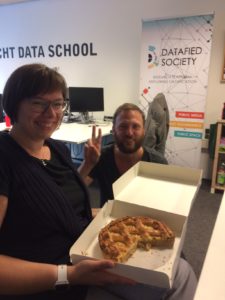Welcoming our 2 new PhDs!
 We are very (!) excited to welcome Tim de Winkel and Maranke Wieringa to our team as PhD students of the department Media and Culture Studies at Utrecht University (starting in September 2018)! Their PhD projects are, in respective order, “Governing Digital Societies in Europe” and “Approaching Algorithmic Account(-)Ability” (see description of these projects and their bios below).
We are very (!) excited to welcome Tim de Winkel and Maranke Wieringa to our team as PhD students of the department Media and Culture Studies at Utrecht University (starting in September 2018)! Their PhD projects are, in respective order, “Governing Digital Societies in Europe” and “Approaching Algorithmic Account(-)Ability” (see description of these projects and their bios below).
Projects
“Governing Digital Societies in Europe” – Tim de Winkel
This project investigates socio-technical, legal and governance aspects of online platforms and data practices. His dissertation will investigate the phenomenon of ‘Fringe platforms’ and their role in the online communication and information practices of the contemporary platform society, through a combination of quantitative and qualitative methods. These alternative platforms celebrate (radical) free speech – even that which has been banned on their mainstream counterparts -, call out against more moderation and governance of the online public sphere, and explicitly challenge the norms of the mainstream platform ecology.
“Approaching algorithmic account(-)ability: developing tools to foster formalized and practical transparency in municipal data projects” – Maranke Wieringa
This research aims to tackles the question: What is the current view on algorithmic accountability within municipalities, (how) do they practice it, and how can this practice be improved? The first part of the investigation will thus sketch a general overview of algorithmic accountability, in collaboration with VNG Realisatie. Aside from this national picture, the project will also look into a concrete case: the algorithmic fraud detection system implemented by several municipalities to screen those who receive benefits (Hijink 2018), which were the topic of recent parliamentary discussion (Security.nl 2018).
The second part of the project will establish a practical intervention in the field: a toolkit will be developed in close collaboration with municipal data professionals (e.g. data scientists, decisionmakers). This collaboration will reveal unique insights into professional perspectives and current practices regarding algorithmic accountability. Developing the toolkit provides ‘a seat at the table’, and ‘anthropologicalesque’ insight into the data professionals’ attitudes which will feed back into the former part of the research.
The aim of this toolkit is to help these professionals reflect on the algorithmic decision making process, to formally embed this reflection into municipal data projects, and to create a valid method to provide testimony to the working mechanisms of algorithms and the public values which inform them. In other words, to give more insight in the ‘black box’ (Pasquale 2015) of municipal data projects, conform the GDPR.
Bios
Tim de Winkel, MA (1987) teaches digital methods and data-analytics in the Master New Media and Digital Culture at the University Utrecht, and is a researcher of media, (Dutch) language and culture, affiliated with the Data School and research platform Datafied Society. He specializes in computational text analysis, network visualization, and (mediated) nationalism. Previously, Tim obtained a Ba in Cognitive neuroscience (psychology) and a RMA in Dutch language and literature. Since his master thesis – a computational search for the writer of the Dutch national anthem – he has been part of a research group, consisting of Mike Kestemont, Martine de Bruin, and Els Stronks, that proposes Petrus Datheen as a new candidate for the national anthem’s authorship.
Maranke Wieringa, MA (1992) is currently a Ph.D. candidate at Utrecht University, and has a background in Cultural Studies and Media Studies, with a specialization in software and data. Her dissertation investigates algorithmic accountability in Dutch municipalities, and, following from this insight, Maranke develops a toolkit to empower municipal data professionals to give testimony of the (decisions around the) algorithm. At Utrecht University, Maranke is part of the Datafied Society research platform, and teaches various courses on (scholarly) data analysis. Her academic interests lie at the intersection of software and data (e.g. tool criticism, algorithm studies).

